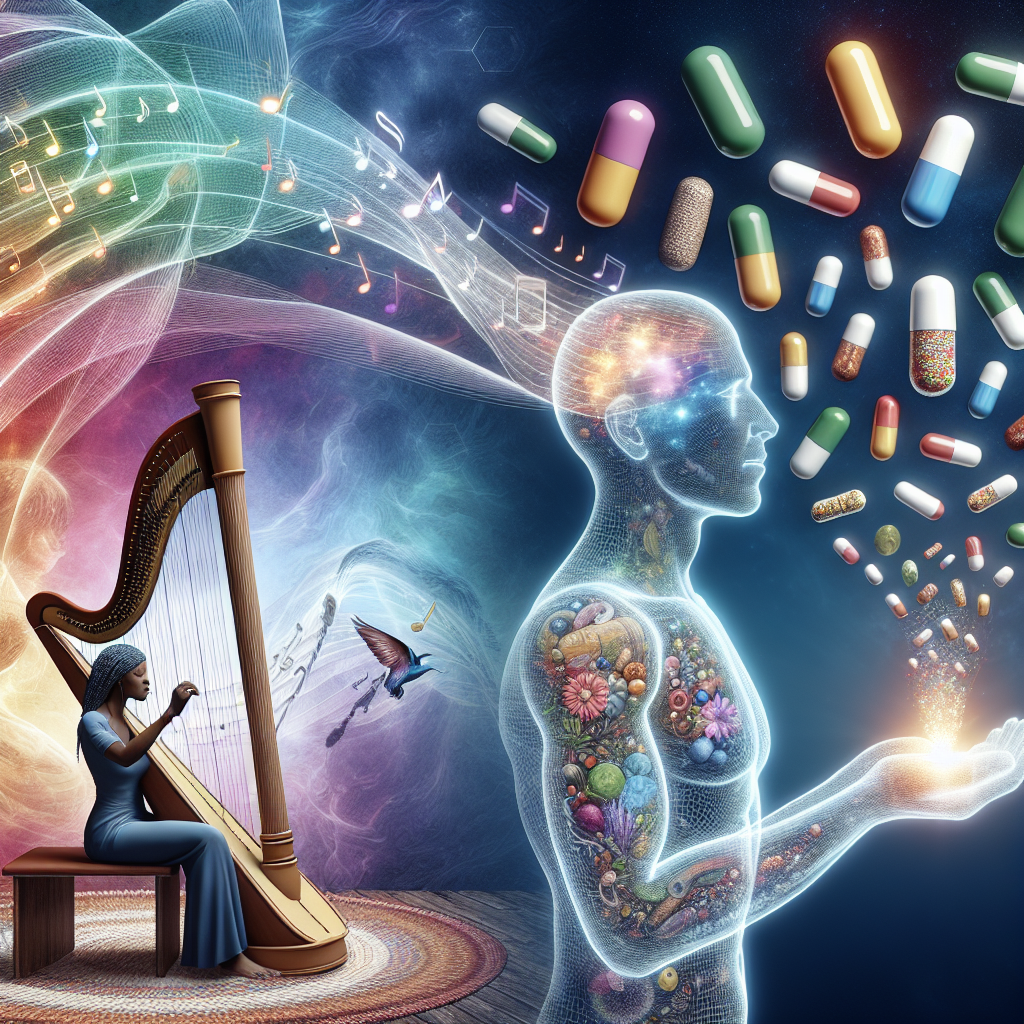How Music Therapy and Vitamins Work Together for Healing

Discover how Music Therapy and Vitamins work together for healing. Uncover the power of this unique combination and how it can enhance your overall well-being. Visit www.myvibrantvitality.com to learn more.
Exploring the Synergistic Effects of Music Therapy and Vitamins on Healing
Music therapy and vitamins, two seemingly disparate elements, have been found to work in harmony to promote healing. This intriguing synergy has been the subject of numerous studies, revealing a fascinating interplay between the physiological and psychological aspects of health.
Music therapy, a well-established health profession, uses music to address physical, emotional, cognitive, and social needs of individuals. It involves a range of activities, from listening to and creating music, to playing instruments and singing. The therapeutic benefits of music are manifold. It can reduce stress, alleviate pain, enhance memory, improve communication, and even promote physical rehabilitation.
On the other hand, vitamins are organic compounds that our bodies need in small quantities for normal growth and metabolism. They play a crucial role in maintaining our health and wellbeing. Vitamins, particularly the B-complex vitamins and vitamin C, have been linked to improved immune function, enhanced energy levels, better brain function, and reduced stress and anxiety levels.
When music therapy and vitamins are combined, they create a powerful healing synergy. The soothing effects of music can enhance the body’s absorption and utilization of vitamins. This is because stress and anxiety, which can be alleviated by music, are known to interfere with the body’s ability to absorb nutrients. By reducing stress levels, music therapy can therefore enhance the effectiveness of vitamins.
Moreover, the psychological benefits of music therapy can be amplified by the physiological effects of vitamins. For instance, the mood-enhancing effects of music can be bolstered by B-complex vitamins, which are known to support the nervous system and enhance brain function. This can lead to improved mental health, better emotional regulation, and enhanced cognitive function.
Conversely, the physiological benefits of vitamins can be boosted by the psychological effects of music therapy. For example, the immune-boosting effects of vitamin C can be enhanced by the stress-reducing effects of music. This can lead to improved physical health, better disease resistance, and faster recovery from illness or injury.
The synergistic effects of music therapy and vitamins are not just theoretical. They have been demonstrated in numerous studies. For instance, a study published in the Journal of Advanced Nursing found that music therapy combined with vitamin C supplementation significantly reduced anxiety levels in patients undergoing surgery. Another study published in the Journal of Clinical Nursing found that music therapy combined with B-complex vitamins significantly improved mood and cognitive function in elderly patients.
In conclusion, the combination of music therapy and vitamins offers a holistic approach to healing that addresses both the physiological and psychological aspects of health. This synergy can enhance the effectiveness of both music therapy and vitamins, leading to improved physical and mental health, better disease resistance, and faster recovery from illness or injury. Therefore, it is worth considering the inclusion of both music therapy and vitamins in healthcare plans, to harness their combined healing power.
The Role of Music Therapy and Vitamin Intake in Holistic Healing

Music therapy and vitamin intake may seem like two disparate elements, but when combined, they can play a significant role in holistic healing. This unique blend of sound and nutrition can have profound effects on both physical and mental health, offering a comprehensive approach to wellness that transcends traditional medical practices.
Music therapy, a burgeoning field in the realm of health and wellness, uses music to address physical, emotional, cognitive, and social needs of individuals. It involves a range of activities, from listening to music and playing musical instruments to singing and composing songs. The therapeutic benefits of music are manifold. It can reduce stress, improve mood, lower blood pressure, enhance memory, and even alleviate pain. The rhythmic patterns in music stimulate the brain, promoting relaxation and healing.
On the other hand, vitamins are essential nutrients that our bodies need in small amounts to work properly. They play a crucial role in maintaining good health and wellbeing. Each vitamin has specific jobs; for instance, vitamin A is important for vision and immune function, vitamin B helps convert food into energy, vitamin C is necessary for growth and repair of tissues, and vitamin D is vital for bone health. A balanced diet typically provides all the vitamins our bodies need. However, in certain circumstances, such as illness or stress, the body may require more vitamins than usual.
So, how do music therapy and vitamin intake work together for healing? The answer lies in their complementary nature. Music therapy can help create a positive environment that promotes relaxation and reduces stress, thereby enhancing the body’s ability to absorb and utilize vitamins. When the body is relaxed and stress-free, it functions more efficiently, improving digestion and absorption of nutrients from food. This means that the vitamins you consume are more effectively used by your body, contributing to better overall health.
Moreover, music therapy can also stimulate appetite, particularly in individuals who may be experiencing loss of appetite due to illness or treatment side effects. A healthy appetite is crucial for adequate vitamin intake. By encouraging a healthy appetite, music therapy can indirectly contribute to improved vitamin intake, further enhancing its role in holistic healing.
In addition, certain vitamins, such as B vitamins, are known to support brain health and cognitive function. This can enhance the therapeutic effects of music therapy. For instance, improved cognitive function can enhance a person’s ability to engage with music therapy activities, such as playing an instrument or composing a song, thereby maximizing the therapeutic benefits.
In conclusion, the combination of music therapy and vitamin intake offers a holistic approach to healing that addresses both the mind and body. Music therapy provides a non-invasive, enjoyable way to reduce stress and promote relaxation, while vitamins provide the essential nutrients the body needs to function optimally. Together, they can contribute to improved physical and mental health, demonstrating the power of a holistic approach to healing. As research continues to explore this fascinating intersection of sound and nutrition, it is clear that the harmony between music therapy and vitamin intake holds great potential for promoting health and wellbeing.
Unveiling the Connection: How Music Therapy and Vitamins Promote Healing Together
Music therapy and vitamins may seem like an unlikely pair, but recent studies have unveiled a fascinating connection between the two. Both have been independently recognized for their healing properties, but when combined, they can create a powerful synergy that promotes overall health and well-being. This article will delve into the intriguing intersection of music therapy and vitamins, and how they work together to foster healing.
Music therapy, a burgeoning field in healthcare, uses music interventions to address physical, emotional, cognitive, and social needs of individuals. It has been found to reduce stress, improve mood, and even alleviate pain. On the other hand, vitamins, essential nutrients that our bodies need to function properly, play a crucial role in maintaining health and preventing diseases. They boost the immune system, support normal growth and development, and help cells and organs do their jobs.
The connection between music therapy and vitamins lies in their shared ability to stimulate the body’s natural healing processes. Music therapy works by activating the brain’s reward center, releasing a cascade of neurochemicals that promote feelings of happiness and well-being. This, in turn, reduces stress and anxiety, which are known to suppress the immune system and hinder the body’s ability to heal.
Vitamins, particularly the B-complex vitamins and vitamin C, are known for their role in supporting the immune system. They help to strengthen the body’s defenses against illness and infection, and they also play a key role in the production of serotonin, a neurotransmitter that regulates mood, appetite, and sleep. When the body is well-nourished with these essential nutrients, it is better equipped to respond to the positive effects of music therapy.
The synergy between music therapy and vitamins becomes particularly evident when considering their combined effect on mental health. Both music therapy and certain vitamins, such as B-complex vitamins and vitamin D, have been shown to have a positive impact on mental health conditions like depression and anxiety. Music therapy can help to reduce symptoms of these conditions by promoting relaxation and improving mood, while vitamins can support these effects by nourishing the brain and supporting the production of mood-regulating neurotransmitters.
Moreover, the combination of music therapy and vitamins can also be beneficial for physical health. For instance, music therapy has been found to be effective in managing pain and promoting physical rehabilitation, while vitamins can support these effects by promoting tissue repair and reducing inflammation.
In conclusion, the connection between music therapy and vitamins is a testament to the power of holistic health approaches. By addressing both the mind and the body, these two therapies can work together to promote healing and well-being. Whether it’s through the soothing strains of a melody or the nourishing power of essential nutrients, the combination of music therapy and vitamins offers a promising avenue for promoting health and healing. As research continues to explore this fascinating intersection, it’s clear that the melody of healing is a symphony that includes both music and vitamins.